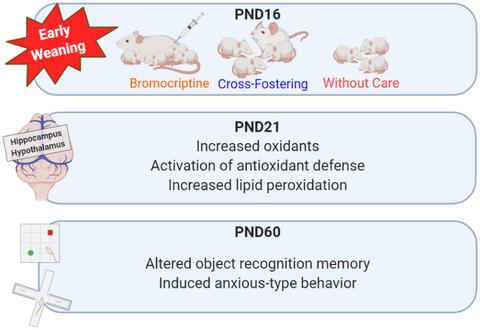当前位置:
X-MOL 学术
›
Int. J. Dev. Neurosci.
›
论文详情
Our official English website, www.x-mol.net, welcomes your feedback! (Note: you will need to create a separate account there.)
Early weaning alters redox status in the hippocampus and hypothalamus of rat pups
International Journal of Developmental Neuroscience ( IF 1.8 ) Pub Date : 2020-07-29 , DOI: 10.1002/jdn.10047 Karoline Dos Santos Rodrigues 1 , Caroline Peres Klein 2 , Pauline Maciel August 1 , Bernardo Gindri Dos Santos 1 , Régis Mateus Hözer 1 , Rafael Moura Maurmann 2 , Mariana Crestani Scortegagna 2 , Juliana Bender Hoppe 2 , Cristiane Matté 1, 2, 3
International Journal of Developmental Neuroscience ( IF 1.8 ) Pub Date : 2020-07-29 , DOI: 10.1002/jdn.10047 Karoline Dos Santos Rodrigues 1 , Caroline Peres Klein 2 , Pauline Maciel August 1 , Bernardo Gindri Dos Santos 1 , Régis Mateus Hözer 1 , Rafael Moura Maurmann 2 , Mariana Crestani Scortegagna 2 , Juliana Bender Hoppe 2 , Cristiane Matté 1, 2, 3
Affiliation

|
Exposure to environmental factors can program the metabolism, conferring resistance or increasing the risk to chronic disease development in childhood and adulthood. In this sense, lactation is an important period in this window of development. Herein, we investigated the effect of early weaning on neurochemical and behavioral changes in offspring at weaning and adulthood. Female and male pups were divided into four groups: (1) Control weaning (weaning on the PND21, pups were kept with the biological mother); (2) Early Weaning Bromocriptine group (EWB) (pharmacological weaning on PND16); (3) Early Weaning Cross‐Fostering group (EWCF) (pups housed with a foster mother on PND16 up to PND21); (4) Early Weaning Without Care group (EWWC) (weaning on PND16, maternal separation). Weight control of pups was recorded from postnatal Day 16 to 59. On the 21st day, part of the pups was euthanized and the hippocampus and hypothalamus were removed for biochemical evaluation. The remaining pups were submitted to behavioral tests on the 60th postnatal day. Early weaning reduced the pups' body weight, in a sex‐dependent way. At 60 days of age, male pups of EWCF and EWWC groups have lower body weight compared to control male, and female body weight was lower than male pups. In relation to biochemical changes in the brain, weaning altered the levels of oxidants, increased the enzymatic activity of superoxide dismutase (SOD), and glutathione peroxidase (GPx), as well as induced lipid peroxidation. Weaning was also able to alter long‐term memory and induce anxious behavior in pups. Our results demonstrate that the different types of early weaning changed the parameters of redox status in the hippocampus and hypothalamus of pups (21 days old), suggesting a prooxidative profile, in addition, to alter learning/memory and inducing an anxious behavior in male offspring (60 days old).
中文翻译:

早期断奶会改变幼鼠海马和下丘脑的氧化还原状态
暴露于环境因素可以编程新陈代谢,赋予抵抗力或增加儿童和成人慢性病发展的风险。从这个意义上说,哺乳期是这个发育窗口的重要时期。在此,我们研究了早期断奶对断奶和成年后后代神经化学和行为变化的影响。雌雄幼崽分为四组:(1)控制断奶(在PND21上断奶,幼崽与生母一起饲养);(2) 早期脱机溴隐亭组 (EWB)(PND16 上的药物脱机);(3) 早期断奶交叉寄养组 (EWCF)(在 PND16 至 PND21 期间与养母一起饲养的幼崽);(4) 无护理早期断奶组 (EWWC)(在 PND16 断奶,母体分离)。从出生后第 16 天到第 59 天记录幼崽的体重控制。第21天,部分幼仔被安乐死,取出海马和下丘脑进行生化评估。其余幼崽在出生后第 60 天进行行为测试。早期断奶以一种性别依赖的方式降低了幼崽的体重。在60日龄时,EWCF和EWWC组的雄性幼仔体重低于对照组雄性,雌性体重低于雄性幼仔。关于大脑中的生化变化,断奶会改变氧化剂的水平,增加超氧化物歧化酶 (SOD) 和谷胱甘肽过氧化物酶 (GPx) 的酶活性,以及诱导脂质过氧化。断奶还能够改变长期记忆并诱发幼犬的焦虑行为。
更新日期:2020-07-29
中文翻译:

早期断奶会改变幼鼠海马和下丘脑的氧化还原状态
暴露于环境因素可以编程新陈代谢,赋予抵抗力或增加儿童和成人慢性病发展的风险。从这个意义上说,哺乳期是这个发育窗口的重要时期。在此,我们研究了早期断奶对断奶和成年后后代神经化学和行为变化的影响。雌雄幼崽分为四组:(1)控制断奶(在PND21上断奶,幼崽与生母一起饲养);(2) 早期脱机溴隐亭组 (EWB)(PND16 上的药物脱机);(3) 早期断奶交叉寄养组 (EWCF)(在 PND16 至 PND21 期间与养母一起饲养的幼崽);(4) 无护理早期断奶组 (EWWC)(在 PND16 断奶,母体分离)。从出生后第 16 天到第 59 天记录幼崽的体重控制。第21天,部分幼仔被安乐死,取出海马和下丘脑进行生化评估。其余幼崽在出生后第 60 天进行行为测试。早期断奶以一种性别依赖的方式降低了幼崽的体重。在60日龄时,EWCF和EWWC组的雄性幼仔体重低于对照组雄性,雌性体重低于雄性幼仔。关于大脑中的生化变化,断奶会改变氧化剂的水平,增加超氧化物歧化酶 (SOD) 和谷胱甘肽过氧化物酶 (GPx) 的酶活性,以及诱导脂质过氧化。断奶还能够改变长期记忆并诱发幼犬的焦虑行为。



























 京公网安备 11010802027423号
京公网安备 11010802027423号